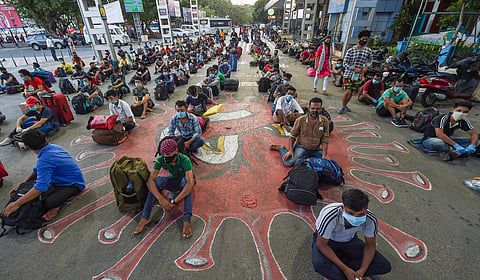

NEW DELHI: Over 50 per cent of households in rural India are cutting down on their food items following the COVID-19-induced lockdown, according to a study by leading civil rights bodies.
The sample size of the collaborative study 'COVID-19 induced Lockdown-How is Hinterland Coping' was over 5,000 households in 47 districts in 12 states of the country.
It was conducted by civil society organisations PRADAN, Action for Social Advancement, BAIF, Transform Rural India Foundation, Grameen Sahara, SAATHI-UP and the Aga Khan Rural Support Programme with research support of Vikas Anvesh Foundation and Sambodhi.
The study showed that 50 per cent of households have reduced the number of meals ever since the lockdown was imposed as part of the immediate adjustment for food security.
About 68 per cent of households reduced the number of items in their meals, it said.
The nationwide lockdown was imposed from March 25 to April 14, then extended to May 3 and again to May 17 to prevent the spread of the novel coronavirus that has claimed 2,415 lives and infected 74,281 people in the country.
The study showed that 84 per cent of households received food items through the public distribution system (PDS), 37 per cent received take-home ration.
It said about 24 per cent of households borrowed foodgrain in villages and 12 per cent of people received free food.
The findings of the study were released in a webinar on Wednesday.
The study found that households have depended on Kharif stock more than Rabi, but that stock is now depleting fast.
"Households are coping with the shock by eating less food and fewer times, and with large dependence on PDS.
There is a need for increased food support through PDS and promotion for food crop cultivation in Kharif," the study said.
It said the preparedness for Kharif 2020 is low and there is a need for public support in terms of seed provision and credit.
A large chunk of migrants are also yet to return to rural India, the study said.
"Lockdown and rumours have indeed adversely affected income - dairy and poultry. The coping mechanisms mostly clustered around change in food habits and reduction in expenditures," it said.
The study said borrowing is taking place due to indebtedness and this might increase if the effect of shock prevails.
Though asset sales are still low but they are already being reported by a small fraction of respondents, it said.
The states where the study was conducted were Assam, Bihar, Chhattisgarh, Gujarat, Jharkhand, Karnataka, Maharashtra, Madhya Pradesh, Odisha, Rajasthan, Uttar Pradesh and West Bengal.
The study found that another worrying factor was that nearly one-third of the respondents reported that there is a possibility that their children will drop out of schools for discretionary expenses.
Speaking at the webinar, Madhu Khetan, Programme Director at PRADAN, said the study was conducted in villages which were comparatively more accessible.
The situation in remote villages might be worse, Khetan said.
Girish Sohani, president, BAIF, said the survey also raises certain health aspects and there will be more such surveys to better assess the ground situation.
India's economy has been severely hit by the coronavirus-induced lockdown with thousands of people losing their means of livelihood across the country.
To deal with the situation, Prime Minister Narendra Modi on Tuesday announced an economic stimulus package for Rs 20-lakh-crore, estimated at 10 per cent of the GDP.
The special economic package will have emphasis on land, labour, liquidity and laws, and will be for "our labourers, farmers, honest taxpayers, MSMEs and cottage industry", Modi had said.